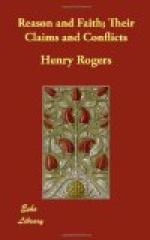____
Very forgetful of this have the advocates of infidelity usually been: nay, (as if they would make up in the number of objections what they want in weight,) they have frequently availed themselves not only of apparent contrarieties, but of mere incompleteness in the statements of two different writers, on which to found a charge of contradiction. Thus, if one writer says that a certain person was present at a given time or place, when another says that he and two more were there; or that one man was cured of blindness, when another says that two were,— such a thing is often alleged as a contradiction; whereas, in truth, it resents not even a difficulty—unless one historian be bound to say not only all that another says but just so much, and no more. Let such objections be what they will, unless they prove absolute contradictions in the narrative, they are as mere dust in the balance, compared with the stupendous mass and variety of that evidence which confirms the substantial truth of Christianity. And even if they establish real contradictions, they still amount, for reasons we are about to state, to dust in the balance, unless they establish contradictions not in immaterial but in vital points. The objections must be such as, if proved, leave the whole fabric of evidence in ruins. For, secondly, we are fully disposed to concede to the objector that there are, in the books of Scripture, not only apparent but real discrepancies,—a point which many of the advocates of Christianity are, indeed, reluctant to admit but which we think, no candid advocate will feel to be the less true. Nevertheless, even such an advocate of the Scriptures may justly contend that the very reasons which necessitate this admission of discrepancies also reduce them to such a limit that they do not affect, in the slightest degree, the substantial credibility of the sacred records; and, in our judgment, Christians have unwisely damaged their cause, and given a needless advantage to the infidel, by denying that any discrepancies exist, or by endeavouring to prove that they do not. The discrepancies to which we refer are just those which, in the course of the transcription of ancient books, divine or human, through many ages,—their constant transcription




